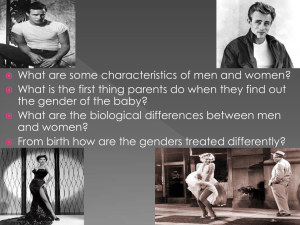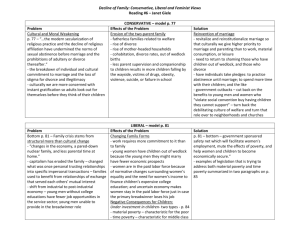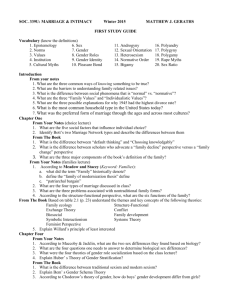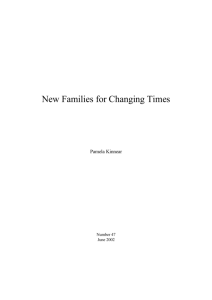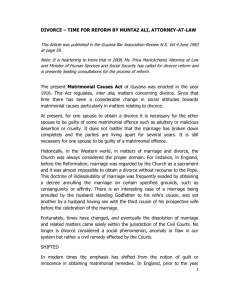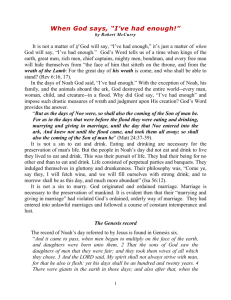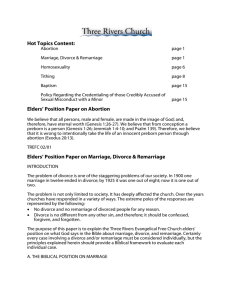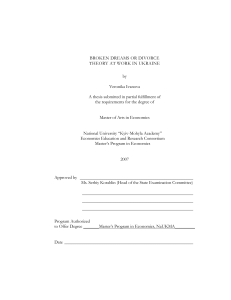family law reforms august 2007
advertisement
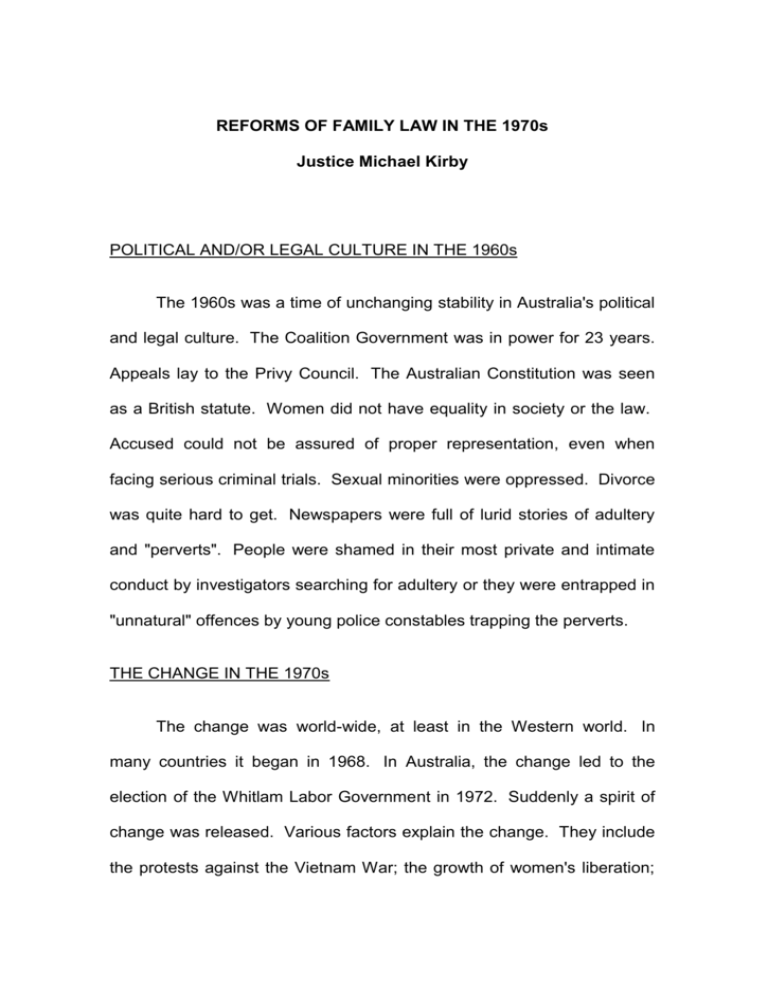
REFORMS OF FAMILY LAW IN THE 1970s Justice Michael Kirby POLITICAL AND/OR LEGAL CULTURE IN THE 1960s The 1960s was a time of unchanging stability in Australia's political and legal culture. The Coalition Government was in power for 23 years. Appeals lay to the Privy Council. The Australian Constitution was seen as a British statute. Women did not have equality in society or the law. Accused could not be assured of proper representation, even when facing serious criminal trials. Sexual minorities were oppressed. Divorce was quite hard to get. Newspapers were full of lurid stories of adultery and "perverts". People were shamed in their most private and intimate conduct by investigators searching for adultery or they were entrapped in "unnatural" offences by young police constables trapping the perverts. THE CHANGE IN THE 1970s The change was world-wide, at least in the Western world. In many countries it began in 1968. In Australia, the change led to the election of the Whitlam Labor Government in 1972. Suddenly a spirit of change was released. Various factors explain the change. They include the protests against the Vietnam War; the growth of women's liberation; 2. the fall of the White Australia Policy; and the acceptance of the need to abolish criminal oppression of sexual minorities and to be more honest about sexual matters generally. The contraceptive pill was significant for women's liberation as was the changing law on abortion. I will attach an article I have written for Meanjin on the 50th Anniversary of Wolfenden Report. MARRIAGE AND THE STATE Marriage was difficult to be extracted from in the early 1970s. The need to prove matrimonial fault was a feature of divorce law at that time. This necessity reinforced women's inequality in marriage. Apart from the legal restrictions there were social and economic restrictions. Many firms would not employ married women. My mother had to pretend to be unmarried, in 1939, until I came along and it became hard to hide. My paternal grandmother secured a divorce in the 1930s. That was unusual at that time. She also smoked; also unusual then. She and her sisters were well read and stood up for women's rights. One of the sisters was a communist and a friend of Jessie Street. My grandmother re-married the treasurer of the Australian Communist Party (Jack Simpson). 3. FAMILY LAW BILL Naturally, I supported the Family Law Bill when Attorney-General Lionel Murphy introduced it. It secured a free vote in the Federal Parliament. There was a lot of opposition from some churches. I remember Lionel Murphy's excitement at getting it passed. He directed the destruction of discretion statements in the court files. That was a big piece of mischief but it removed a cloud of potential gossip from many people's heads. Because of my sexual orientation, I did not feel immediately affected by the Family Law Act. Perhaps I did not give it as much thought to it as other reforms at the time. I did not see it as ever affecting me personally. However, intellectually, I certainly supported (and support) the notion that people should not be forced into marriage or forced to remain married. Moreover, there is a strong case for recognising same-sex marriage, as accepted in the Supreme Court of Canada; the Constitutional Court of South Africa; the Supreme Judicial Court of Massachusetts and other courts and bodies. My Peter Nygh Lecture, also attached, states my views. 4. FAMILY LAW ACT: A SUCCESS? No doubt there were flaws in the Family Law Act. Looking back, the dissent in Quilter v Attorney-General (NZ) looks more convincing today (to me at least) than the majority view. But no one in those days would have thought about same-same marriages. Same-sex relations were then still criminalised in all of Australasia. The first reforming law was enacted in South Australia in 1975, proposed by Premier Don Dunstan. Just getting the Family Law Act through Federal Parliament was difficult enough. By way of contrast, the 2005 Marriage Amendment Act was to prove easy for the combined Coalition and Labor Parties. Some say that making divorce easy meant people did not persist with relationships and that there will be a lot of lonely old people in Australia who formerly would have stuck marriage out. However, the temper of the time no longer supported forcing people to stay together. Women's economic advancement, equal pay and assertion of rights made this notion impossible to sustain. Legal Change was inevitable. It swept through Scandinavia, down to England and was copied in most other Western English-speaking countries. In Australia, the surprise was the strength of the opposition. There is still some of it about. Mostly, the Act, and subsequent reforms, were to benefit and protect women and the 5. children who generally stayed with the ex-wife after divorce. This was just one of many reforms that Attorney-General Murphy introduced and got through an often hostile Parliament. He was a great law reformer. REFORMS OF FAMILY LAW IN THE 1970s Justice Michael Kirby

